Spotlight
New Research in Buddhist Studies
This monthly lecture series is devoted to bringing the latest research in the academic study of Buddhism to a larger audience. While the academic study of Buddhism draws on an array of methods and perspectives that can complement, enrich, and inspire Dharma practice, it can be difficult to access and engage for non-specialists. This series aims to bridge that gap by bringing academic scholars and Dharma practitioners together in conversation, giving scholars the opportunity to present their work with a non-specialist audience in mind, and the audience an opportunity to ask questions and offer their reflections. It is hosted by Mangalam Research Center Academic Director, Karin Meyers.
In 2023-2024 we are exploring the topic of “Buddhism and the Natural World.”
David Loy, “A Conversation with David Loy on Buddhism, Modernity, and the Ecological Crisis” – September 19th, 3-4:30pm PDT on Zoom.
Devin Zuckerman, “Buddhist Elemental Thought Across Time, Place, and Genre,” October 3rd, 3-4:30pm PDT on Zoom.
Jason Wirth, “Great Earth Sangha: Gary Snyder, Dōgen, and the Ecological Emergency,” November 6th, 4pm-5:30pm PST on Zoom.
Adam Liddle, “Listening to the Elements” October 17th, 4-5:30pm PDT on Zoom. November 14, 4-5:30pm, PST.
Steve Beyer, “A Conversation with Steve Beyer, on plant medicine, peacemaking and the visionary worlds of Tibetan Buddhism and Mestizo Shamanism,” November 13, 3-4:30pm PST.
Please find details and links to registration below.
PAST EVENT
Listening to the Elements
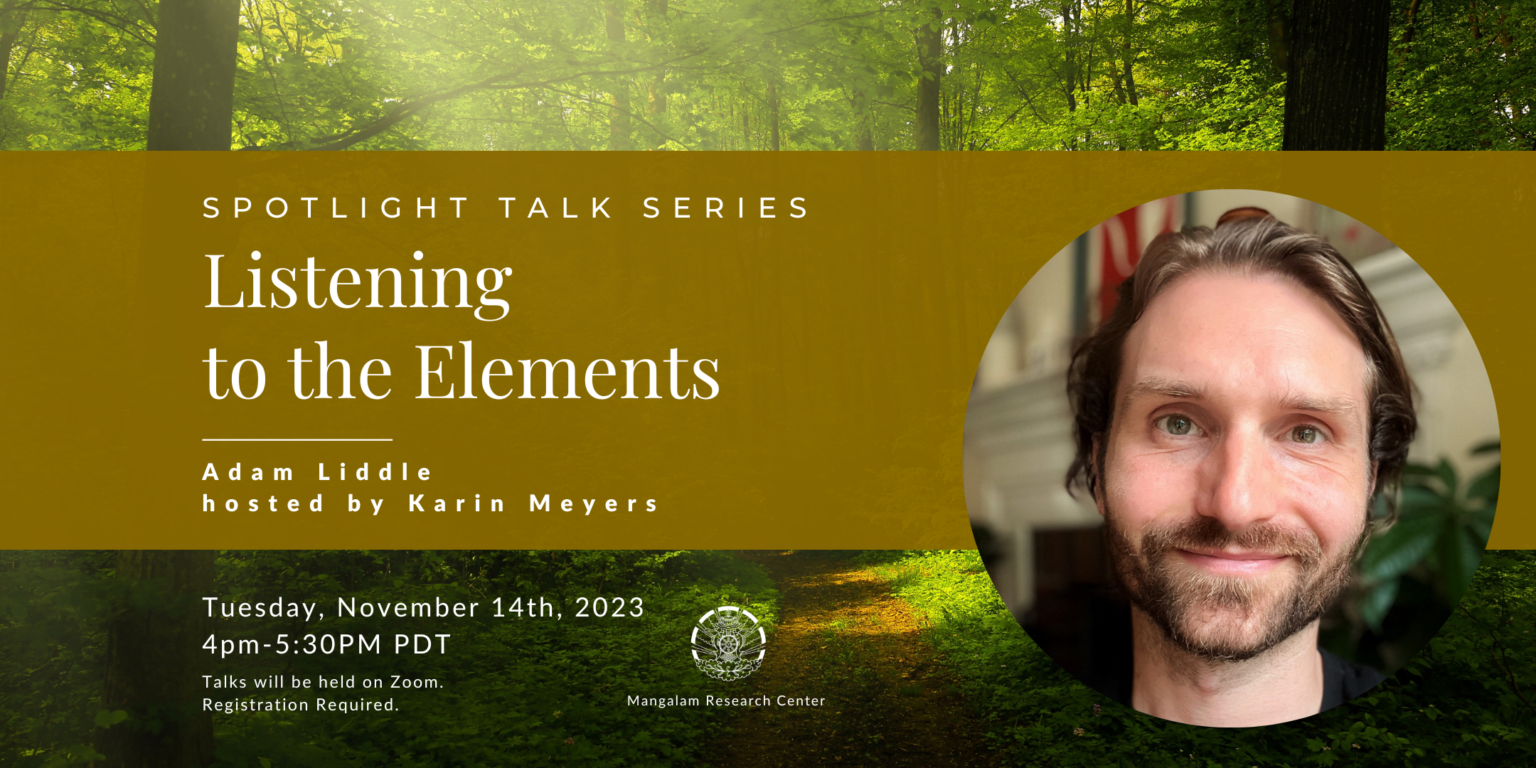
Adam Liddle
New Date: Tuesday, November 14, 4-5:30pm PST
In the Tibetan Renaissance of the 11th-12th Centuries, the Nyingma school of Tibetan Buddhism cared deeply about our senses and our natural environments as vehicles for transformation and liberation. In this presentation, I will focus on the Unimpeded Sound Tantra (sgra thal ‘gyur) of the Great Perfection that features contemplations on the elemental sounds of water, earth, fire, and wind. I will detail the complex interweaving in these practices of natural environments, elemental embodiments, Buddhist ideologies, and transcendent experiences that come from listening to the natural world. I find that expressed philosophical views and prescriptions for contemplation combine in this text, creating platforms for uniquely Buddhist atmospheres in nature that dissolve subject-objection distinctions while maintaining the individualization of elemental pathways. To help think through these complicated practices, I will also bring into conversation the contemporary academic discourse of affective atmospheres, in which perceptions and environments come together to create enveloping and transformative spaces. Through these reflections, we can begin to reconstruct the creative ways that Tibetan Buddhist authors have historically designed pathways for religious experience using the natural world and consider the ways that such attention to nature affected their larger contemplative traditions.
Adam Liddle (he/him) is a postdoctoral research assistant at the Contemplative Sciences Center at the University of Virginia. His work focuses on the history of philosophy and contemplation in Tibetan Buddhism, in particular at their intersection with sound, hearing, and the senses. His dissertation, Acoustic Awakening: Sound and Sonic Imagination in Tibetan Buddhism is currently available from the University of Virginia Library.
PAST EVENT
A Conversation with Steve Beyer on plant medicine, peacemaking, and the visionary worlds of Tibetan Buddhism and Mestizo Shamanism
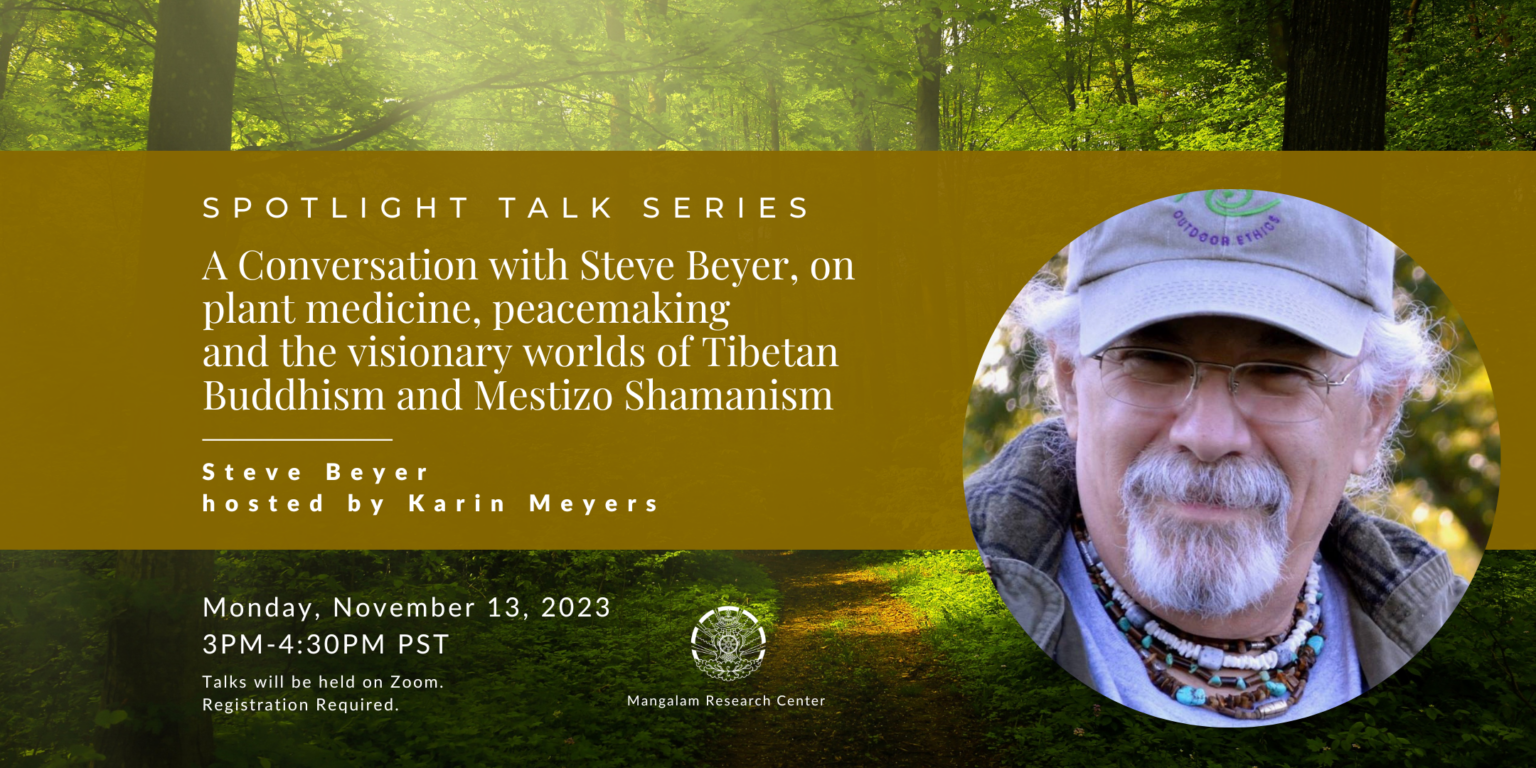
Steve Beyer
New Date: November 13, 3-4:30 PST
This conversation will focus on Steve’s comparative reflections on the visionary worlds of Tibetan Buddhism and Mestizo shamanism, as well as on sacred plants and how we might all serve as peacemakers in these troubled times. There will be plenty of time for audience questions and discussion with Steve. Please find a link to recommended readings below.
Steve Beyer, Ph.D., J.D., scholar, adventurer, and expert on both jungle survival and plant hallucinogens, is well-known to students of Tibetan Buddhism as the author of two seminal, now classic, works, The Cult of Tara (1973) and The Classical Tibetan Language (1992). His 2010 book, Singing to the Plants has been praised as the “the best book on ayahuasca yet” and “the most comprehensive examination of Amazonian shamanism ever written,” and his most recent book, The Talking Stick (2016), draws on his training in restorative justice, non-violent resistance, and council, offering practical instructions on listening with the heart and peacemaking. Steve has also worked as a lawyer and wilderness educator, and is a long-time practitioner of shikantaza meditation and a certified tai chi instructor.
PAST EVENT
Great Earth Sangha: Gary Snyder, Dōgen, and the Ecological Emergency
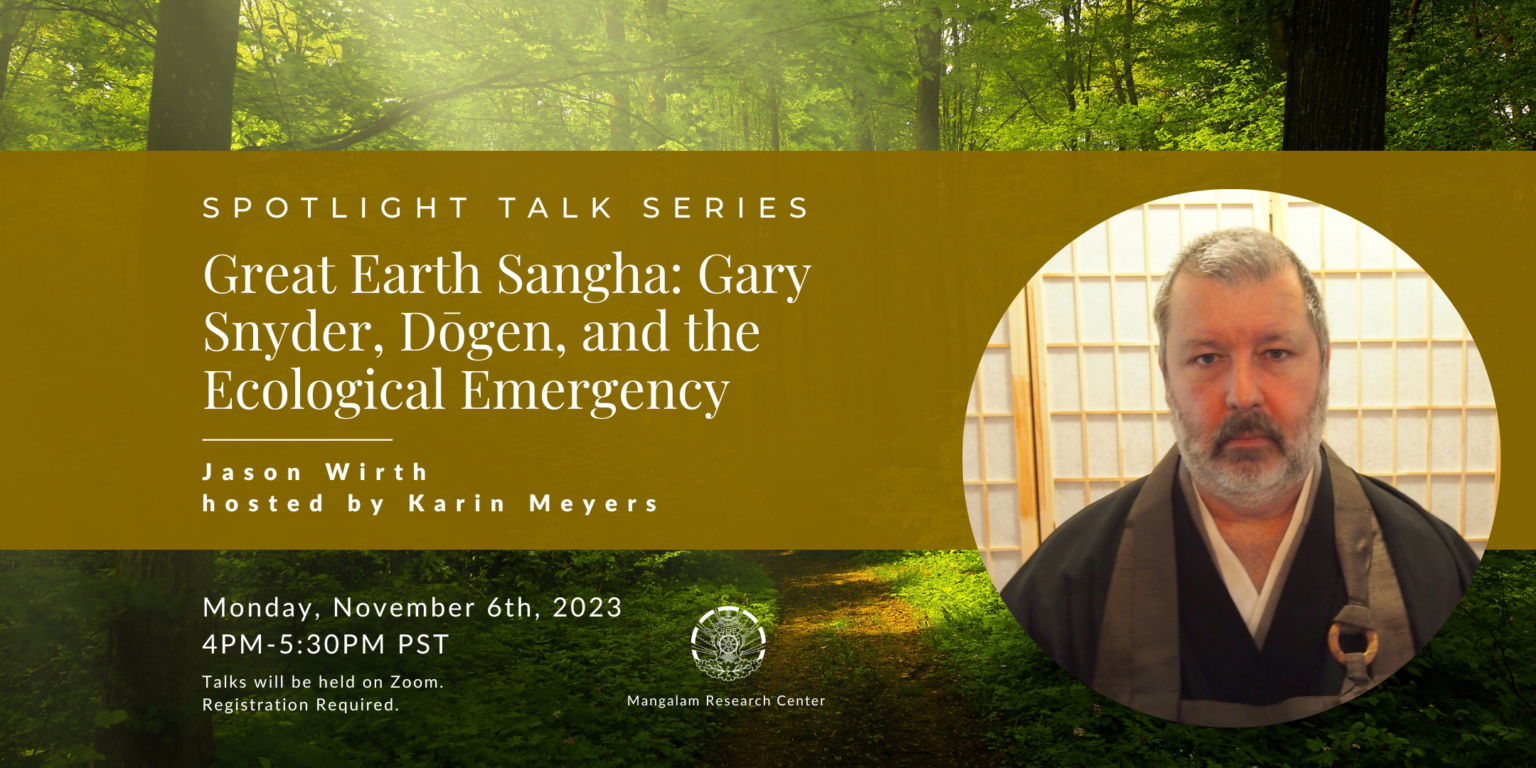
Jason Wirth
Monday, November 6th, 4-5:30pm PST
Gary Snyder has been a lifelong Zen practitioner. Although his training had been in the Rinzai tradition, he also developed a profound appreciation for Eihei Dōgen (1200-1253), who helped him formulate what he called a practice of the wild. We will examine both figures in the context of the current ecological emergency and explore ways in which both figures offer ways to understand and respond to it.
Dr. Jason M. Wirth is professor and chair of Philosophy at Seattle University as well as a Soto Zen priest. His recent books include Mountains, Rivers and the Great Earth: Reading Gary Snyder and Dōgen in an Age of Ecological Crisis as well as Nietzsche and Other Buddhas: Philosophy After Comparative Philosophy.
PAST EVENT
Buddhist Elemental Thought Across Time, Place, and Genre
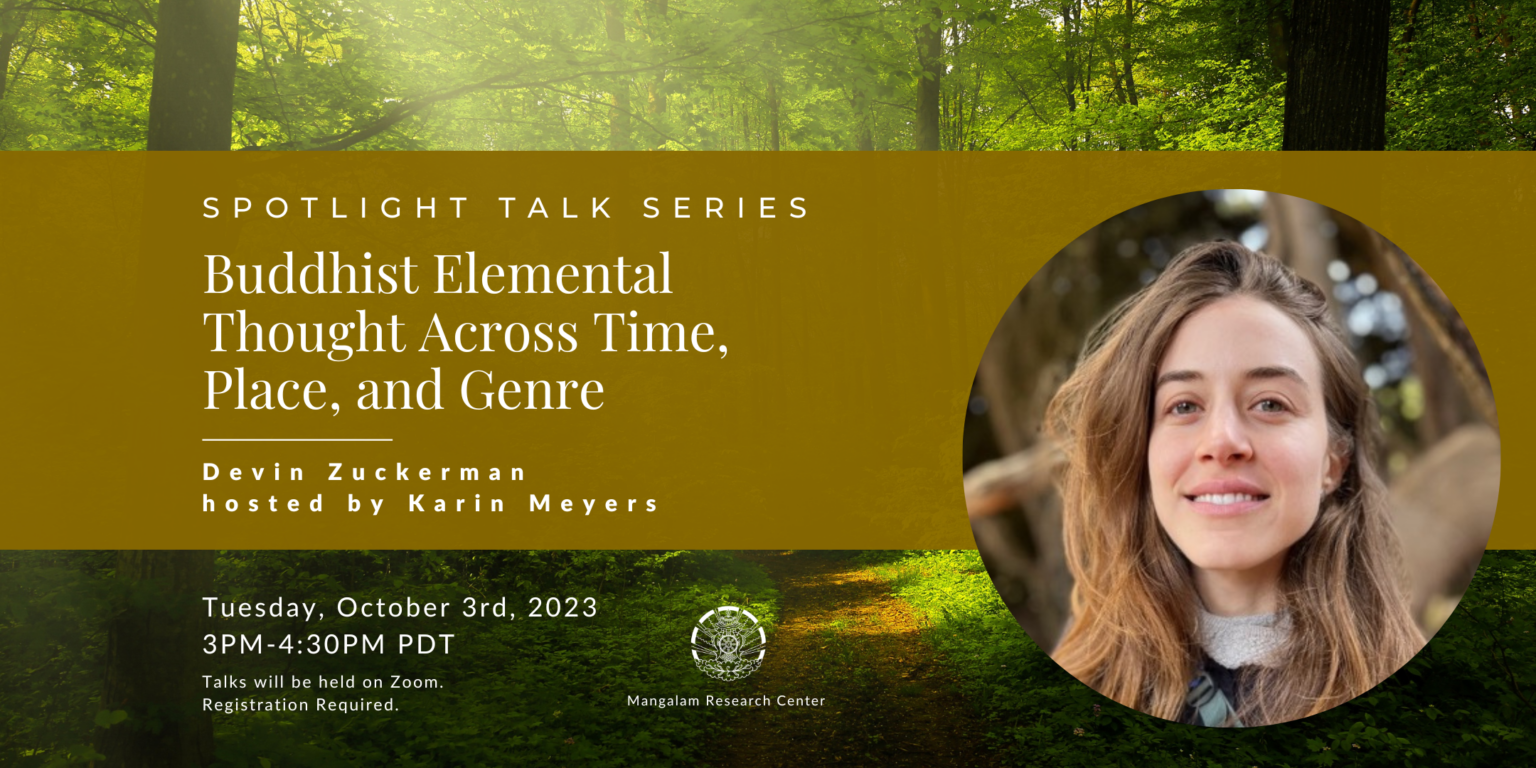
Devin Zuckerman
Tuesday, October 3rd, 3-4:30pm PDT
Buddhist theories of the primary elements of earth, water, fire, and wind are widely known as characterizations of the “natural world” in the context of the materialist philosophies of the Abhidharmatraditions. However, less scholarly attention has been paid to their important role in other kinds of Buddhist knowledge systems and practices, such as contemplation, ritual, medicine, and astrology. These discourses, which have been entwined with doctrine in important ways throughout Buddhist history, convey a different set of concerns, preoccupations, and theorizations regarding the world and its inhabitants, human and otherwise. Drawing on materials from across the Indian and Tibetan Buddhist canon, this talk explores a diverse array of elemental theories and practices as an overlooked site for Buddhist understandings of the “natural world.”
Devin Zuckerman is a Ph.D. candidate at the University of Virginia, currently completing her dissertation, “Earth, Water, Fire, Wind, and Space: Elemental Theory in the Development of the Great Perfection Seminal Heart (Rdzogs chen snying thig) Tradition of Tibet.” Her research examines Tibetan Buddhist discourses on the body, the senses, and the surrounding environment, and the role of these themes in contemplative practice traditions.
PAST EVENT
A Conversation with David Loy on Buddhism, Modernity, and the Ecological Crisis
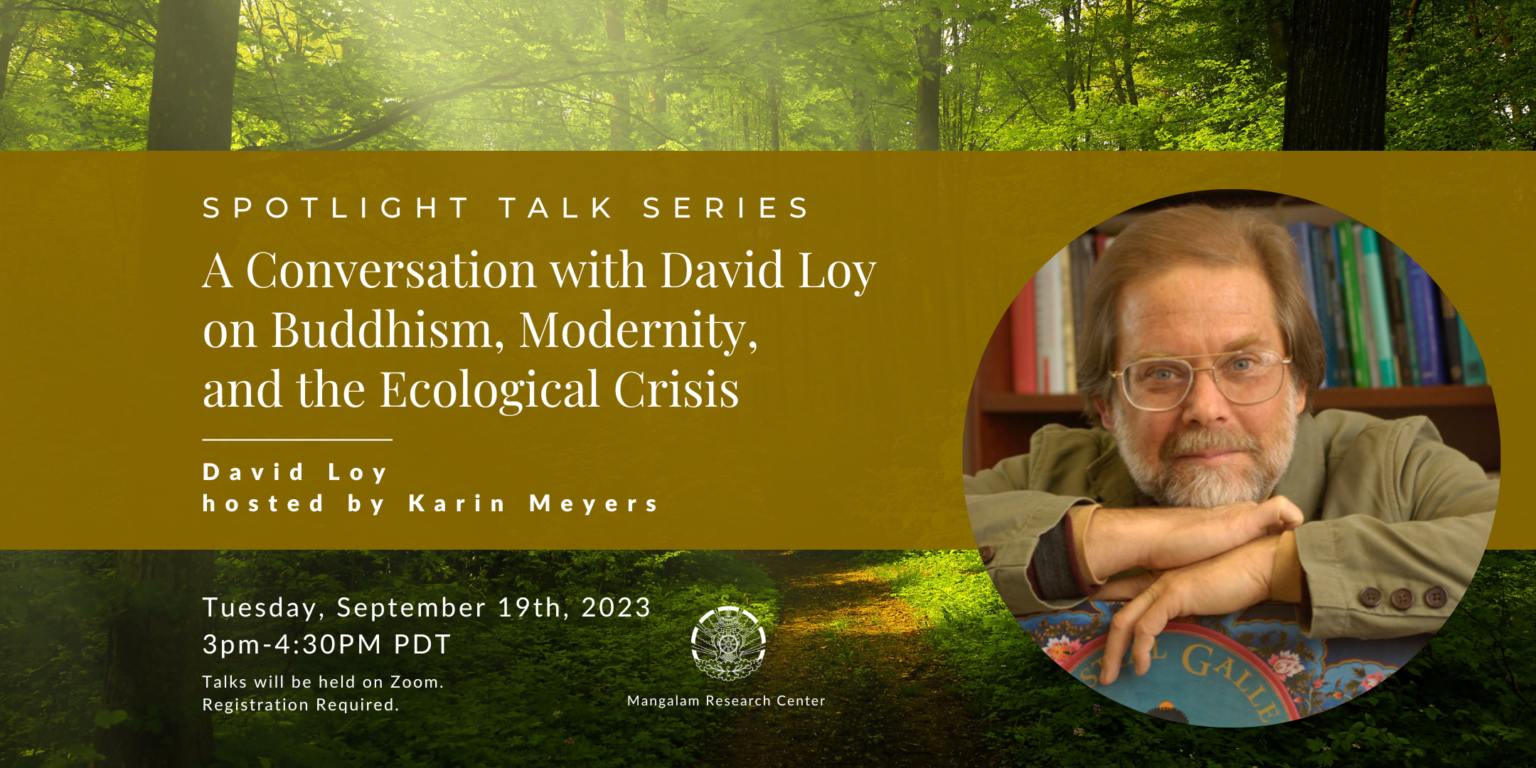
David Loy
Tuesday, September 19th, 3-4:30pm PDT
Mangalam Research Center Academic Director, Karin Meyers will talk to David Loy about how Buddhism offers resources and alternative perspectives on the social and ecological crises of modernity, as well as how Buddhism may need to evolve to help (post-)modern persons meet these challenges. There will be plenty of time for audience discussion with David.
David Loy is a professor [now retired], writer, and Zen teacher in the Sanbo Zen tradition of Japanese Zen Buddhism. He is one of the founding members of the new Rocky Mountain Ecodharma Retreat Center, near Boulder, Colorado. His books include Ecodharma: Buddhist Teachings for the Ecological Crisis, A New Buddhist Path, and Lack and Transcendence.
PAST EVENT
Buddhism and Climate Change
Dr. Daniel Capper
October 17, 2022
Today more than ever we need a robust set of environmental ethics that can steer us in positive directions, and Buddhism can provide us with at least some of the moral ecological guidance that we require. Yet, like with all systems of ethics, Buddhist environmental practices sometimes do not lead to the most satisfying results. Hence, a synthetic analysis of how Buddhism may help us to move forward appropriately in the climate change age as well as a clear-sighted understanding of the limits of Buddhist environmental ethics may provide great ecological value. This presentation will pursue precisely such value while exploring a comprehensive, critical, and analytical investigation of the theory, practice, and real-world ecological performance of Buddhist environmental ethics.
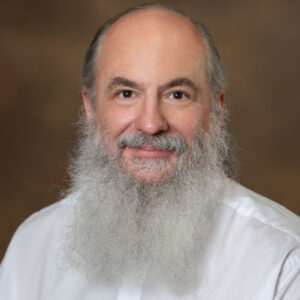
Daniel Capper, Ph.D. is a Professor at the University of Southern Mississippi. Trained at the University of Chicago in the field of science and religion dialogue, his interdisciplinary studies explore environmental ethical interactions with the nonhuman natural world comparatively as well as among American Buddhists. Capper’s many publications include the books Learning Love from a Tiger: Religious Experiences with Nature, Roaming Free like a Deer: Buddhism and the Natural World, and Buddhist Ecological Protection of Space: A Guide for Sustainable Off-Earth Travel.
PAST EVENT
Translating the Vimalakīrtinirdeśa Sūtra
Dr. Paul Harrison
April 21, 2022
In 1999, a Sanskrit version of the Vimalakīrtinirdeśa, long thought lost, was discovered in the Potala Palace in Lhasa by a team of scholars from Taishō University in Japan, who then presented it to the world in a series of landmark publications. Previous English renderings of this classic Mahāyāna text had been based on Chinese or Tibetan translations and not the Indic Sanskrit. Mangalam Research Center for Buddhist Languages sponsored a three-week workshop on the newly discovered text in 2010, led by five eminent scholars. At the end of the workshop, the decision was made to prepare a full translation.
Building on the initial efforts of workshop participants and working closely with Luis Gómez before he passed away, Paul Harrison, the George Edwin Burnell Professor of Religious Studies at Stanford University, has carried the English translation to completion. The result is a careful and scholarly treatment of this enduring text by two dedicated interpreters and translators of Buddhist literature. Elegantly translated and easily readable, this is a major contribution to the study and understanding of this playful and complex text.
Join Mangalam Research Center Academic Director, Karin Meyers for an interview with Paul Harrison on the text, translation and place of the work in Mahāyāna Buddhist thought.
Paul Harrison (he/him) is the George Edwin Burnell Professor of Religious Studies, Chair of the Department of Religious Studies, and Co-Director of the Ho Center for Buddhist Studies at Stanford University. He specializes in Buddhist literature and history, especially that of the Mahāyāna, and in the study of Buddhist manuscripts in Sanskrit, Chinese and Tibetan. He is the author of The Samādhi of Direct Encounter with the Buddhas of the Present, and numerous articles on Buddhist sacred texts and their interpretation. He is also one of the editors of the series “Buddhist Manuscripts in the Schøyen Collection.”
PAST EVENT
Kūkai: Japanese Buddhism's first Vajrayāna visionary
Dr. David Gardiner
March 31, 2022
While it is widely recognized that Mahāyāna sutra literature is replete with wild imagery, supernormal events and visions of celestial and earthly delights, the presence of creative, visionary language in śāstra or commentarial literature is not commonly acknowledged. And yet, the distinction between these literary genres hardly fits the contours of a neat mythopoeic vs. logo-centric split. Exploring the writings of the 9th century monk Kūkai, we will examine some of the riches of Mahāyāna imagination in its early Japanese Vajrayāna manifestation. Here, the force of metaphor, myth and creative enthusiasm abound, as Kūkai strives to imbue the world of ancient Japan with the adornments of esoteric Buddhist thought and practice.
David Gardiner, (he/him) is Associate Professor of Religion at Colorado College, where he has taught since 1998. He specializes in the life and works of Kūkai (774-835). Introduced to the study of Buddhism by Prof. Robert Thurman at Amherst College, he completed doctoral studies at Stanford and has spent many years doing research in Japan. Having published many articles and book chapters, his first book on Kūkai, with the same title as this talk is expected to come out in 2022. He is working on two other books, one a translation and study of Kūkai’s Treatise on the Two Teachings: Exoteric and Esoteric, and the other on the functions of myth, metaphor and narrative in Buddhist thought and practice, with a focus on Kūkai.
PAST EVENT
Hungry Ghosts and the Karma of Meanness
Dr. Andy Rotman
February 3, 2022
Join the conversation as Mangalam Research Center’s Academic Director, Karin Meyers, interviews Andy Rotman about his recent book, Hungry Ghosts (Wisdom Publications, 2021). The book shows how an understanding of the meanness (mātsarya) that afflicts hungry ghosts illuminates the human condition, offering insight and inspiring compassion for readers in ancient times and today. We will discuss the moral world of hungry ghosts, how one can avoid their terrible fate, and what representations of hungry ghosts can tell us about Buddhist communities around the world.
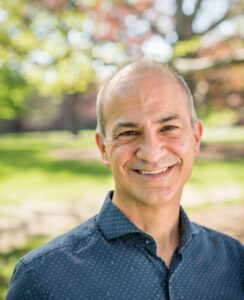
Andy Rotman (he/him) is a professor of Religion, Buddhism, and South Asian Studies at Smith College. He has been engaged in textual and ethnographic work on religious and social life in South Asia for more than twenty-five years. His publications include Divine Stories: Divyāvadāna, Part 1 and Part 2 (Wisdom Publications, 2008 and 2017), Thus Have I Seen: Visualizing Faith in Early Indian Buddhism (Oxford University Press, 2009), and a coauthored volume, Amar Akbar Anthony: Bollywood, Brotherhood, and the Nation (Harvard University Press, 2015).
Photo Dharma from Sadao, Thailand, CC BY 2.0, via Wikimedia Commons
PAST EVENT
Buddhist Studies on Stage? What the Buddha Never Taught: A Rock Opera
Dr. Martin T. Adam
December 16, 2021
Can the creation of a broadway-style Buddhist musical comedy be justified in Buddhist terms? This presentation explores the challenges and dilemmas of adapting Buddhism for the stage — as encountered by the speaker in writing and producing his new play, What the Buddha Never Taught: A Rock Opera. The challenges encompass ethical concerns regarding cultural appropriation as well as practical issues arising from different stages of project development, including the writing of Buddhist pop songs. The project will be discussed from a perspective based in Buddhist ethics, reflecting on questions of motivation and consequence.
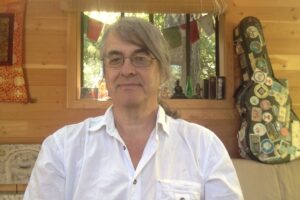
Martin T. Adam, (he/him) is Associate Professor of Religious Studies at the University of Victoria, Canada. Much of his work has been centered on Buddhist ethics, as well as Buddhist meditation theory. In recent years he has entered into different kinds of creative writing as a way of exploring and expressing his engagement with Buddhism.
PAST EVENT
Sūtra Time
Dr. Natalie Gummer
December 2, 2021
Why do stories of past lives and visions of the future play such a central role in many Mahāyāna sūtras? In this presentation, I explore how attending to the narrative and performative orchestration of time in the sūtras can enhance our understanding of their promises to transform the present lives of their listeners, readers, and reciters. This exploration also offers fresh perspectives on the ways in which contemporary approaches to narrating the past and the future may offer comparable, if also quite different, resources for altering the present.
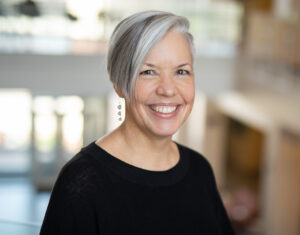
Natalie Gummer, who received her PhD in Buddhist Studies from Harvard University, is Professor of Religious Studies at Beloit College in Beloit, Wisconsin. Her research examines textual practices in premodern Mahāyāna Buddhist literary cultures and their potential value in contemporary ethical and philosophical debates. She is editor of The Language of the Sūtras: Essays in Honor of Luis Gómez and is currently completing a book on performativity and embodiment in Mahāyāna sūtras.
PAST EVENT
Other Lives: Mind and World in Indian Buddhist Philosophy
Sonam Kachru
October 28, 2021
Join the conversation as Mangalam Research Center’s Academic Director, Karin Meyers interviews Sonam Kachru about his 2021 book, Other Lives: Mind and World in Indian Buddhist Philosophy on the Buddhist philosopher, Vasubandhu’s Twenty Verses. We will be discussing topics such as dreams and other worlds, the entangled relationship of mind and world (or what it means to inhabit a world), and the importance of friendship on the Buddhist path. We will aim to make the conversation accessible to non-specialists and will save time for questions from the audience.
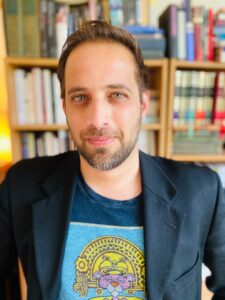
Sonam Kachru (he/him) is an Assistant Professor in the Department of Religious Studies at the University of Virginia. His work centers on the history of philosophy in ancient South Asia, with a particular emphasis on Buddhist philosophy and literature. His first book, Other Lives: Mind and World in Indian Buddhism, is forthcoming with Columbia University Press.

